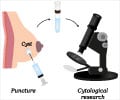Researchers at Georgetown Lombardi Comprehensive Cancer Center have found that stress from social isolation, combined with a high-fat diet, increases levels of a brain neurotransmitter

The researchers said their findings appear to link a number of findings in humans, such as the fact that social isolation is associated with an increased risk of cancer development and mortality, and that obesity is a risk factor for breast cancer."
"We suspect that NPY may play a role in development of human breast cancer, but we have no evidence for such a connection because no human studies have yet been done," said the study's lead investigator, Allison Sumis, student in the Tumor Biology program.
"We do know that NPY has been shown to increase growth of human breast cancer cells in the laboratory," she said.
To conduct the study, the researchers used female mice that develop breast cancer when given progesterone and a carcinogen. They established four groups of these mice: one group that lived together (not socially isolated) and ate a normal diet; a group that was isolated (each alone in a cage) and ate normally; an isolated group that ate a high-fat diet, and a group that lived together and ate a high-fat diet.
Ten weeks after treatment and living in these environments (for a total of 17 weeks), 92 percent of the socially-isolated mice fed a high-fat diet had developed tumors, compared to 36 percent of socially-isolated mice fed a normal diet and 36 percent of grouped mice that were also fed normally. But 67 percent of mice who were happy in group homes, but were fed a high fat diet, developed breast cancer.
Advertisement
"We have yet to translate these findings to humans, but it does suggest that social isolation is a potent stressor and initiates a robust central nervous system response," she said.
Advertisement
The study has been reported at the American Association for Cancer Research (AACR) 102nd Annual Meeting 2011.
Source-ANI















